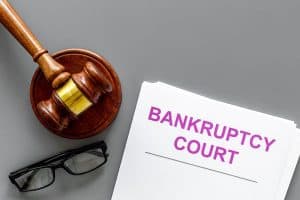 Automatic Stay from Bankruptcy May Not Apply to Individual Indemnitors
Automatic Stay from Bankruptcy May Not Apply to Individual Indemnitors
by Andrew Vicknair
A recent ruling by the United States District Court for the District of Maryland[1] held that an automatic stay pursuant to a bankruptcy filing may not apply to non-bankrupt co-defendants who were indemnitors on a bond.
The case involves a claim by a plaintiff-surety, Travelers Casualty & Surety Company (“Travelers”), against its principal, East Coast Welding & Construction Co. Inc. (“East Coast”), and the indemnitors on the bond, Christopher Brown and Anita Brown. In March 2020, Travelers, as surety, issued two field dues and fringe benefit bonds (“Bonds”) in the amount of $75,000 each for East Coast, as principal, and Local Lodge 45, International Brotherhood of Boilermakers, Iron Ship Builders, Blacksmiths, Forgers and Helpers (“Local 45”) as obligee.[2] The Bonds were mandatory pursuant to a collective bargaining agreement between East Coast and Local 45.
In order to obtain the Bonds, Christopher Brown and Anita Brown (“Indemnitors”) were required to personally execute a general indemnity agreement (“Indemnity Agreement”) in favor of Travelers whereby they personally agreed to be jointly and severally liable to Travelers for any loss Travelers incurred in connection with the Bonds.[3]
In October 2020, the Local 45 and others made claims in excess of $395,000 (“Claims”) against the Bonds claiming that East Coast failed to remit or retain all or portions of union dues and various contributions that were secured by the Bonds.[4]
After receiving the Claims, Travelers sought a response from the Indemnitors to the Claims and asked whether the Indemnitors had any defenses or set-offs against the Claims.[5] During a phone conversation regarding the Claims, Indemnitors acknowledged that approximately $180,000 was due and owing to Local 45 and other claimants on the Bonds, which was in excess of the $150,000 Bonds.[6]
As a result of the Claims, Travelers made two payments of $75,000 totaling $150,000 under the Bonds to Local 45 and other claimants in April 2021. Travelers then requested repayment of the $150,000 from East Coast and from Christopher and Anita Brown – the Indemnitors, but they failed to respond.[7] Due to the lack of response, Travelers filed suit seeking indemnification in September of 2021. Suit was filed against East Coast and Mr. and Mrs. Brown personally.
The defendants answered the suit and eventually in March 2022, Travelers moved for summary judgment against East Coast and Mr. and Mrs. Brown for the repayment.[8] After the summary judgment was filed, in September 2022, one of the defendants, East Coast, initiated Chapter 11 Bankruptcy proceedings and requested the District Court stay all proceedings including any ruling on the summary judgment filed by Travelers.[9]
Before the summary judgment could be considered the Court had to determine whether or not the entire case was stayed, including claims by Travelers against Christopher and Anita Brown, the Indemnitors, as a result of the Bankruptcy filing by East Coast. If the stay extended to the Indemnitors, then the District Court could not decide Travelers’ motion for summary judgment until the conclusion of the Bankruptcy filed by East Coast.
Defendants argued that the case should be stayed by operation of law pursuant to 11 USC § 362. Specifically, 11 USC § 362(a)(1) acts as a stay to the continuation of a judicial, administrative, or other action or proceeding against the debtor that was or could have been commenced before the commencement of the Bankruptcy. Mr. and Mrs. Brown argued that the entire case should be stayed because there was no independent cause of action against Mr. and Mrs. Brown as the claims against Mr. and Mrs. Brown are intertwined with the claim against East Coast.[10] The District Court rejected the Browns’ argument noting that Travelers’ breach of contract claims against Mr. and Mrs. Brown – the Indemnitors – under the Indemnity Agreement were independent causes of action as to each defendant – both Mr. and Mrs. Brown.[11] And as indemnitors, they are jointly and severally liable to Travelers for the payments made under the Bonds.[12] The District Court also recognized that pursuant to the Indemnity Agreement as joint and several contractual indemnitors, both Mr. and Mrs. Brown owe a separate obligation to reimburse Travelers fully for losses incurred – including the $150,000 payments under the Bonds.[13]
The District Court ultimately held that 11 USC § 362 does not extend to the Indemnitors – Mr. and Mrs. Brown. Thus, the automatic stay granted to East Coast due to the Bankruptcy filing does not prevent the continuation of the proceedings against the non-bankrupt co-defendants, Mr. and Mrs. Brown – the Indemnitors.[14] Therefore, the District Court proceeded with the summary judgment filed by Travelers against Mr. and Mrs. Brown, as indemnitors, under the Indemnity Agreement.
The District Court granted the summary judgment in favor of Travelers against Mr. and Mrs. Brown and held that the Indemnitors – Mr. and Mrs. Brown breached the Indemnity Agreement.
While courts often stay matters when bankruptcy proceedings are initiated by a party, it is possible that proceedings may continue to any non-bankrupt parties if there exists an independent cause of action. With the instant ruling, personal indemnitors under a bond will not always be shielded from continuation of claims based upon a bankruptcy filed by the principal or by a related company/co-defendant when the personal indemnitors are not pursuing bankruptcy proceedings.
[1] Travelers Cas. v. E. Coast Welding, BPG-21-1992, 2022 U.S. Dist. LEXIS 218493 (D. Md. Dec. 2, 2022).
[2] Id. at 2 – 3.
[3] Id.
[4] Id. at 3.
[5] Id. at 4.
[6] Id.
[7] Id. at 5.
[8] Id.
[9] Id. at 6.
[10] Id. at 6 – 8.
[11] Id. at 8.
[12] Id. at 9.
[13] Id.
[14] Id. at 8.



